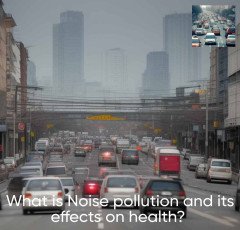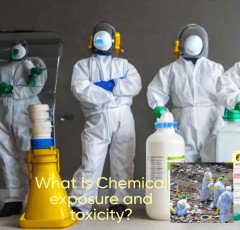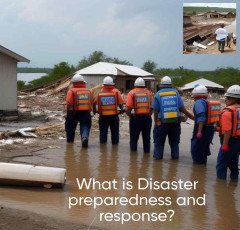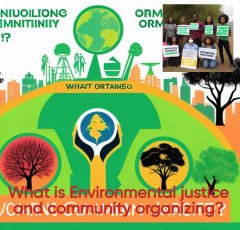
What is Noise pollution and its effects on health ?

Any excessive or undesired sound that interferes with how people, animals, and the environment normally function is referred to as noise pollution. Noise pollution is frequently caused by aircraft, building sites, loud music, and industrial machines.
Numerous detrimental impacts of noise pollution on human health include:
Hearing loss:
Prolonged exposure to loud noise can harm the inner ear's hair cells, resulting in permanent hearing loss.
Noise pollution can disrupt sleep and create insomnia, which can result in weariness, irritation, and subpar performance at work or school.
Cardiovascular issues:
Long-term exposure to noise pollution can raise your chance of developing hypertension, heart disease, and stroke.
Cognitive impairment:
Noise pollution can affect memory and focus, making it challenging to carry out mental tasks or retain information.
Mental health issues:
Long-term exposure to noise pollution raises the chance of developing anxiety, depression, and other mental health concerns.
Limiting exposure to loud noises, using noise-cancelling headphones or earplugs, and advocating for laws that regulate noise levels in public areas are all vital steps to take in order to lessen the negative impacts of noise pollution.
Additional negative consequences of noise pollution on people's health include:
Stress and anxiety:
Loud or persistent noise can make people feel anxious or stressed out, which can produce physical reactions including a faster heartbeat, higher blood pressure, and the release of stress hormones like cortisol.
Tinnitus:
Tinnitus is a condition in which exposure to loud noises results in a ringing, buzzing, or whistling sound in the ears. This can affect daily living and quality of life could be either temporary or permanent.
Communication obstruction: Noise pollution can hinder communication, which can result in misunderstandings and social isolation.
Birth defects:
Low birth weight, early birth, and developmental issues in children are birth abnormalities that can be caused by exposure to loud noises during pregnancy.
Aggression and irritability:
Noise pollution, especially in children and teenagers, can cause aggressive behavior and irritation.
Noise pollution can have detrimental effects on animals in addition to human health, such as obstructing communication, destroying habitats, and altering behavior and migration patterns. Therefore, it's critical to limit noise pollution to safeguard the health of both people and the environment.
There are numerous methods to lessen noise pollution, such as:
Installing sound-absorbing materials in buildings can lessen the transmission of sound from external sources. This is known as soundproofing.
Limiting exposure:
Reducing or avoiding exposure to loud noises, for example, by wearing earplugs or noise-cancelling headphones.
Using quieter equipment:
In industrial and construction situations, using quieter equipment helps lower noise levels.
Designing quieter modes of transportation can help cut down on traffic noise pollution. Examples of these are electric vehicles and hybrid engines.
Enforcing noise restrictions:
Enforcing and implementing noise restrictions in public areas, such as parks and neighborhoods, helps lessen noise pollution.
Education and awareness:
Raising public understanding of the detrimental impacts of noise pollution and the practical measures that may be taken to decrease it can result in changes in behavior and attitudes about noise.
As a whole, noise pollution can have a variety of detrimental consequences on human health, such as hearing loss, sleep disruption, cardiovascular concerns, cognitive decline, and mental health problems. It's crucial to limit exposure to loud noises, use earplugs or noise-cancelling headphones, and support legislation that limits noise levels in public areas if you want to prevent noise pollution.
A person can also take the following actions to lessen noise pollution in their daily lives:
Reduce the volume:
You may lessen indoor noise pollution by lowering the level on equipment like TVs and stereos.
Use sound-absorbing materials:
Including sound-absorbing items in your home, including carpets or drapes, can assist lower noise levels.
Plant trees and other vegetation to help with sound absorption and to lessen noise pollution in outdoor areas.
Use public transportation:
Using buses or trains instead of driving can help cut down on traffic noise pollution.
Be considerate of others:
Being aware of your own and other people's tolerance limits for noise can assist decrease noise pollution in communal areas.
By doing these actions, people can contribute to a quieter and more tranquil environment for themselves and others while also reducing noise pollution in their own lives.
It's also important to note that governments and organizations have additional options for reducing noise pollution on a larger scale, including:
Planning for noise reduction can help to lessen noise pollution in public areas like parks, airports, and crowded streets. Planning for noise reduction can help.
Encourage the use of quiet technology:
In the transportation and industrial sectors, encouraging the use of quieter machinery and technology can assist minimize noise pollution.
Enforcing noise ordinances:
Enforcing noise ordinances and levying fines or other sanctions for noise infractions can aid in the reduction of noise pollution.
Promoting public transportation:
Promoting public transportation can help to reduce traffic noise pollution and advance a more environmentally friendly method of transportation. Examples of public transportation include buses and trains.
Research:
Investigating the health impacts of noise pollution and figuring out the best solutions can help direct laws and other measures to lessen it.
Noise pollution can have a variety of detrimental effects on the environment and human health. Governments and organizations can take more extensive measures to minimize noise pollution on a broader scale, while individuals can take steps to reduce noise pollution in their daily lives. Together, we can make a world that is quieter, healthier, and more peaceful for both present and future generations.
Last but not least, it's significant to remember that noise pollution is a worldwide issue that has an impact on individuals in both urban and rural locations. Due to rising population density, urbanization, and industry, noise pollution is a significant issue in many developing nations.
As a result, it's critical to promote laws and measures that will limit noise pollution both locally and worldwide as well as to increase public awareness of its harmful consequences. We can make everyone's atmosphere more tranquil and healthy by cooperating.
As it affects productivity, tourism, and real estate values, noise pollution can also have negative effects on the economy.
Studies have demonstrated, for instance, that noise pollution can lower the value of properties near busy roads or airports as well as lower the standard of living for local inhabitants. Additionally, noise pollution can have an effect on tourism by detracting from the allure of travel places. Due to stress and weariness, noise pollution in the workplace can cause a decline in productivity and an increase in absenteeism.
Therefore, lowering noise pollution can be advantageous for the economy, as well as for the environment and public health.
We can build a more productive society by enforcing noise rules, encouraging quieter, more environmentally friendly technologies, and modes of transportation.
The effects of noise pollution on people's health, the environment, and the economy are serious and widespread.
We can improve the quality of life for both current and future generations by adopting both individual and group action to prevent noise pollution.
It's important to note that noise pollution can have disproportionate effects on marginalized and vulnerable communities, including low-income areas, native communities, and communities of color. In addition to having less political clout to push for noise reduction measures, these areas may be more likely to be situated close to sources of noise pollution, such as industrial sites, highways, and airports.
Reducing noise pollution is important for social justice as well as the environment and human health.
Prioritizing these groups' needs in attempts to reduce noise is crucial, as is making sure they have a say in the processes of making decisions.
We can build a more just and equitable world for everybody by eliminating noise pollution in a comprehensive way.
This can involve actions like carrying out environmental impact analyses to find potential sources of noise pollution and their effects on nearby communities, interacting with locals and community leaders to learn about their priorities and concerns, and putting into practice noise reduction strategies that put the needs of marginalized and vulnerable communities first.
In addition, as part of a larger effort to create a more sustainable and equitable world, it's critical to acknowledge the interconnection of environmental challenges and deal with noise pollution. We can not only lessen noise pollution but also address other issues by supporting environmentally friendly transportation options, cutting greenhouse gas emissions, and investing in green infrastructure.
In order to build a world that is healthier, more just, and more sustainable, it is essential to reduce noise pollution. We can build a better future for ourselves and future generations if we work together.
I concur entirely! As we proceed, it's crucial to understand the links between various environmental problems and work toward holistic solutions that tackle several concerns at once. We can build a more resilient, equitable, and sustainable world for all by adopting a holistic perspective.
Prioritizing the needs and viewpoints of those who are most affected by noise pollution and other environmental problems is also crucial.
This can entail collaborating closely with neighborhood groups, having conversations with them, and making sure their opinions are heard during decision-making processes.
Each of us may help to lessen noise pollution in our homes and neighborhoods.
This may entail making minor adjustments, including lowering the level on electrical gadgets, utilizing materials that are less noisy, and picking environmentally friendly modes of transportation. We can help create a society that is healthier, more peaceful, and more sustainable by acting and making deliberate decisions.
A crucial first step in minimizing noise pollution is taking personal action. We may contribute to a broader effort to create a more peaceful and sustainable planet by making little adjustments in our daily lives.
At the same time, it's crucial to understand that one person's activities do not suffice. We require concerted effort at the local, national, and international levels to effectively address noise pollution and other environmental problems. This can entail promoting laws and rules that give public health and noise reduction first priority, encouraging investments in environmentally friendly infrastructure and transportation options, and participating in advocacy and public conversation.
The task of reducing noise pollution is intricate and varied, necessitating intervention at various levels.
We can build a more tranquil, healthy, and sustainable world for ourselves and future generations by adopting a holistic strategy that integrates individual action, community participation, and policy and advocacy activities.
Exactly! Collaboration and action at all levels are required to build a more sustainable and healthy planet. We can only effectively handle the issues we face by working together.
As we go, it's critical to remember that the fight against noise pollution is just one part of a bigger initiative to build a more equitable and sustainable world. We can advance by dealing with the underlying sources of noise pollution, such as unsustainable industrial and transportation operations.
Reducing noise pollution ultimately aims to create a world where everyone can prosper.
Together, we can build a society that is not just quieter but also healthier, more resilient, and more equal by putting public health, environmental sustainability, and social justice as a priority.
To make the world more sustainable and fair for everyone, noise pollution reduction is crucial.
We can move closer to a more tranquil, healthy, and sustainable future by putting public health and well-being first, advocating for environmentally friendly transportation and infrastructure, and taking part in group action and advocacy campaigns.
It's critical to understand that minimizing noise pollution entails tackling more extensive environmental and social problems in addition to improving the acoustics of the surroundings. We can come up with ideas that improve various facets of our life by understanding how environmental problems are interconnected and using a holistic approach to problem-solving.
At some point, we must all take action, both individually and collectively, to help create a more sustainable and just world. We can build a society where everyone has the chance to prosper, free from the detrimental effects of noise pollution and other environmental issues, by cooperating toward a shared vision of a better future.


















 SEO Checklist
SEO Checklist  The Click Engine
The Click Engine  Acer Laptop
Acer Laptop  Only For The United States
Only For The United States  Sennheiser
Sennheiser  Best Robotic Vacuum Cleaners
Best Robotic Vacuum Cleaners  Hot Bags For Pain Relief
Hot Bags For Pain Relief  Online Technology Classes
Online Technology Classes  BEST SELLER TOP10
BEST SELLER TOP10  Best Home Appliances
Best Home Appliances  All Wireless Products
All Wireless Products  Favorite Company (Cuelinks)
Favorite Company (Cuelinks)  NordLocker
NordLocker  Hello Theme
Hello Theme  Smart Doorbell
Smart Doorbell  SOFAS
SOFAS  One World Collection
One World Collection  Men Clothing
Men Clothing  Amazon Best Selling Products
Amazon Best Selling Products  NordVPN
NordVPN  Unreal Engine 5 For Beginners Learn The Basics Of Virtual Production
Unreal Engine 5 For Beginners Learn The Basics Of Virtual Production  RPM 3.0
RPM 3.0  Best Sellers On Amazon
Best Sellers On Amazon  Artificial Intelligence
Artificial Intelligence  Unlimited access to classes on illustration, photography, design, film, music
Unlimited access to classes on illustration, photography, design, film, music  Graphics & Design
Graphics & Design  TitTok Revolution
TitTok Revolution  Best Selling Books
Best Selling Books  ELECTRONIC ACCESSORIES
ELECTRONIC ACCESSORIES  Online Marketing
Online Marketing  Women Fashion
Women Fashion  The Secret Email System
The Secret Email System  Top Rated From Amazon
Top Rated From Amazon  Creative Brief For Video Shoot
Creative Brief For Video Shoot  ASUS Laptop
ASUS Laptop  1150+Trendy kids coloring pages Bundle
1150+Trendy kids coloring pages Bundle  ASPINAL LONDON
ASPINAL LONDON  NordPass
NordPass 
















